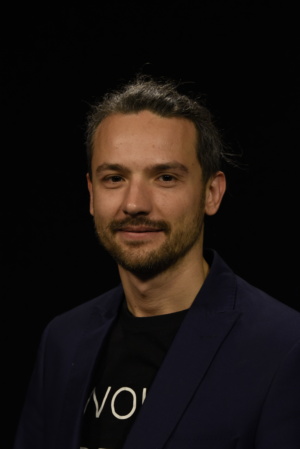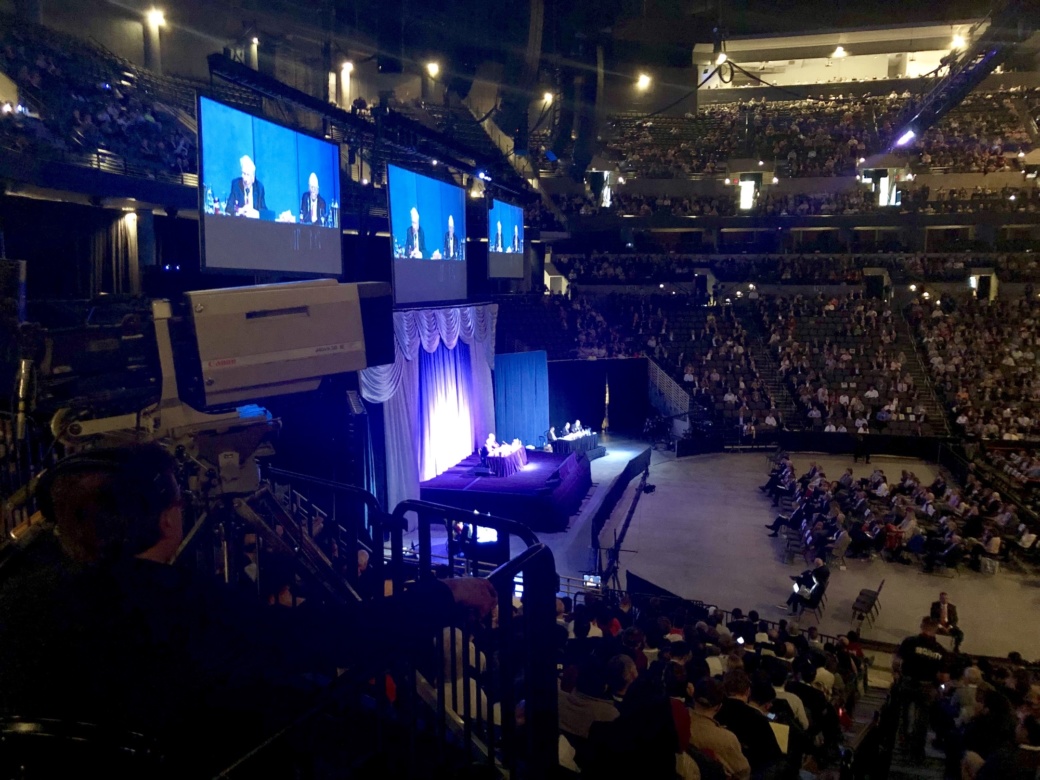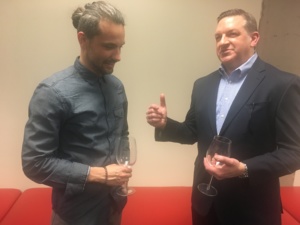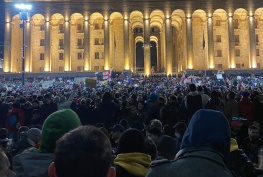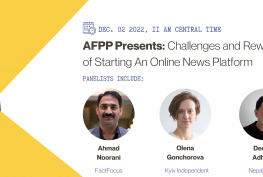Being abroad is never emotionally easy. We’ve all experienced that distress when leaving our countries for a vacation or a short business trip. You have to adapt quickly to local habits, accept (and try to understand) the culture, meet new people, eat the new food and speak a foreign language. Every day. In other words, you have to stay focused to keep the pace. Otherwise you’re lost.
Now imagine doing all that for six months in a row, while also working daily at a top-level media outlet among Pulitzer-winning investigative journalists. This is what the Alfred Friendly Press Partners Fellowship experience is. At least for me, personally.
After attending a comprehensive three weeks training hosted by the University of Missouri School of Journalism and Investigative Reporters and Editors at the beginning of the fellowship, I started working at Newsy, a Columbia-based progressive national TV channel. Each time someone asked me to explain in my own words what actually Newsy is, I was always answering: “It’s like Netflix, but just for journalism.” This media outlet, launched as a start-up by Mizzou alumni and initially staffed by the student community, provides media content on various traditional and non-traditional (on demand) TV platforms, and considers “millennials” as its base audience.
Being a millenial myself, I didn’t have any trouble adapting to the newsroom. However, the quality standards at Newsy was something that I was learning every day as a fact-checker and researcher for a TV show called “What The Fact” (produced along with PolitiFact) and as an assistant producer for a podcast called “What the Health” (produced along with KHN). Among the most conclusive research I did during the time spent at Newsy are these two: an analysis of the bipartisan take on healthcare and comparative analyses on turnovers in the American governments since President George W. Bush.
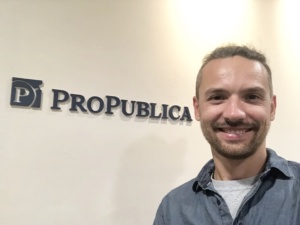 After seven weeks at Newsy, I joined ProPublica — the most important investigative media non-profit in the United States. I worked in their office in New York, sharing the newsroom with investigative and data journalists who have won Pulitzer, Peabody and Emmy awards. My goal was to gain new expertise while also sharing my experience back home with the Organized Crime and Corruption Reporting network.
After seven weeks at Newsy, I joined ProPublica — the most important investigative media non-profit in the United States. I worked in their office in New York, sharing the newsroom with investigative and data journalists who have won Pulitzer, Peabody and Emmy awards. My goal was to gain new expertise while also sharing my experience back home with the Organized Crime and Corruption Reporting network.
I teamed up with reporters from ProPublica and WNYC Studios to work on a podcast called Trump Inc. My responsibilities included, but were not limited to, producing profiles on all the people from Russia or the former Soviet Union that appeared in the Mueller Report. By working on this, I had a chance to interview people connected to Russia’s security forces, criminal activities and banking sector (some of the interviewees belonging to all three categories).
This experience was really important for me to understand the general context of the American media situation. I think that there are only a few countries where a foreign journalist is assigned and encouraged every day to investigate the president of that country for months. And that’s not made in order to challenge the First Amendment of the U.S. Constitution. Having this media culture implies that accountability and transparency of the government is the cornerstone of democracy, while high level corruption is like a cancer for the political system.
What is also great about ProPublica is that it provides a perfect environment to learn new things daily and really explore your limits. I think there are not so many newsrooms even in this country when you can come with a crazy transparency project idea to an editor and you receive this answer in an upbeat tone: “Why not?”
My “crazy idea” was starting an access to information litigation project by sending dozens of FOIA requests to federal government institutions. I started the project in June, and by August a few other colleagues at ProPublica got interested and joined the project just to keep track of the responsiveness of the authorities. Another good thing about this project is that it will extend my personal collaboration with ProPublica after the end of the fellowship period. But I should also give credit to federal institutions such as the Department of Defense and the General Services Administration, whose answers to FOIA questions might take up to one year.
Obviously, my Alfred Friendly Press Partners Fellowship was not only about working. I was really lucky to experience in full two Americas: the “ground floor America,” while living, studying and working in Columbia, Missouri, and traveling across Midwest; and the “skyscraper America,” while living in New York City for three months. And all these experiences were passing at a tremendous speed. I would not lie if I say that it was like living a full American life compressed into six months.
Among multiple personal experiences, I’ve also had a chance to engage in professional-growth activities. While working at Newsy, I had a chance to attend the famous Berkshire Hathaway Shareholder Meeting in Omaha, Nebraska, organized annually and hosted by one of the richest men in the world, Warren Buffett, and his business partner Charlie Munger.
In a way it’s a trend-setting event, a “Woodstock for investors,” where Buffett, an investment guru, talks about his take on the modern economy.
One of the things stuck in my memory forever. It is when Buffett took a question from a young mom in the audience: “How do you survive in times when hundreds of professions are at risk of disappearing, while computers are more and more capable of taking over those duties?” His answer was simple and positive: “One hundred years ago people were panicking about cars taking out the hard labor jobs from people. And it happened. And the world changed in a good way, making our lives easier. The economy will adapt to any change.”
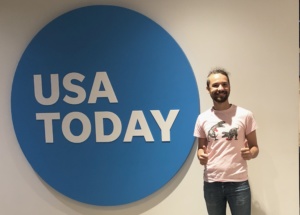 While in New York, I had an opportunity to visit several established media outlets thanks to American colleagues, other Alfred Friendly Press Partners fellows, and the opportunities New York City has to offer to everyone. Those were WNYC (New York City’s public radio station), USA Today’s New York office and CBS Studios’ Ed Sullivan Theater (where the famous “The Late Show with Stephen Colbert” is filmed).
While in New York, I had an opportunity to visit several established media outlets thanks to American colleagues, other Alfred Friendly Press Partners fellows, and the opportunities New York City has to offer to everyone. Those were WNYC (New York City’s public radio station), USA Today’s New York office and CBS Studios’ Ed Sullivan Theater (where the famous “The Late Show with Stephen Colbert” is filmed).
Generally speaking, New York is a place where you can find almost any activity or thing you’re interested in. No matter how odd or rare it is. In one of Martin Scorsese’s films, one of the characters said: “New York is not just the biggest city, it is the only city.” Now, I guess I understand what that means.
The important thing is to stay focused and to know exactly what you want. Being interested in video formats and filmmaking, I’ve attended workshops on documentary filmmaking and scriptwriting at Digital Film Academy, visited the exceptional Museum of Moving Images, and became a regular client of the iconic cinemas like IFC Center, Film Forum and Walter Reade Theater.
There is nothing more important in professional and personal life than to become better (try to) every day. And to my knowledge there is no other fellowship program like Alfred Friendly Press Partners that offers such an opportunity to understand American media context, journalistic standards and society in general at such a deep level by living a life of an American journalist for six months.
I would also like to mention the opportunity to get to know a bit about other cultures as well, by getting along with other fellows coming from around the world. In my case there were talented, smart, charismatic and proactive journalists from China, India, Ghana, Afghanistan, Macedonia and Russia – whom I got to know personally and with whom I’ve established a strong contact for the future. I am really grateful that I’ve become a part of this programe that (I am sure) has changed me as a person and as a journalist.


